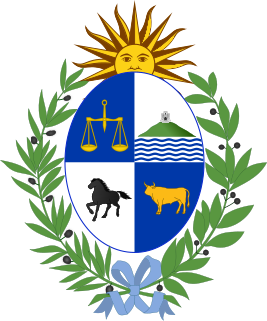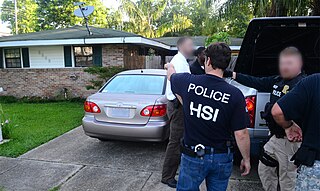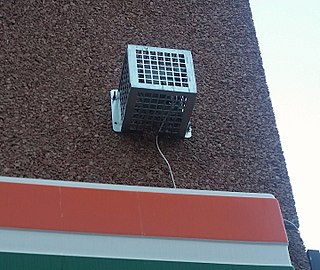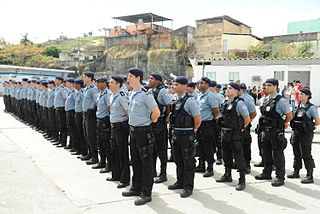 W
WThe 2019 Uruguayan constitutional referendum, officially referred to as the Referendum for constitutional reform on security matters took place alongside general election of that year, on 27 October 2019, to ask the electorate whether a constitutional reform in public security should be approved. The proposed amendments to the Constitution would create a national guard, forbid early release for some serious crimes, introduce life sentences for crimes of rape, sexual abuse or homicide of minors as well as aggravated homicide of adults, and allow the police to conduct night raids. The referendum resulted in 46.8% of the votes cast in favor of amending the Constitution, however, not reaching the necessary 50%, the amendment was not approved, being rejected by 53.7% of the votes.
 W
WAnti-climb paint is a class of paint consisting of a thick oily coating that is applied with a stiff brush, trowel or by hand using a protective glove. In appearance it is similar to smooth gloss paint when applied but it remains slippery indefinitely thereby preventing any intruder from gaining a foothold.
 W
WA bouncer is a type of security guard, employed at venues such as bars, nightclubs, cabaret clubs, stripclubs, casinos, hotels, billiard halls, restaurants, sporting events, or concerts. A bouncer's duties are to provide security, to check legal age and drinking age, to refuse entry for intoxicated persons, and to deal with aggressive behavior or non-compliance with statutory or establishment rules. They are civilians and they are often hired directly by the venue, rather than by a security firm. Bouncers are often required where crowd size, clientele or alcohol consumption may make arguments or fights a possibility, or where the threat or presence of criminal gang activity or violence is high. At some clubs, bouncers are also responsible for "face control", choosing who is allowed to patronize the establishment. In the United States, civil liability and court costs related to the use of force by bouncers are "the highest preventable loss found within the [bar] industry", as many United States bouncers are often taken to court and other countries have similar problems of excessive force. In many countries, federal or state governments have taken steps to professionalise the industry by requiring bouncers to have training, licensing, and a criminal records background check.
 W
WThe broken windows theory is a criminological theory that states that visible signs of crime, anti-social behavior, and civil disorder create an urban environment that encourages further crime and disorder, including serious crimes. The theory suggests that policing methods that target minor crimes, such as vandalism, loitering, public drinking, jaywalking and fare evasion, help to create an atmosphere of order and lawfulness, thereby preventing more serious crimes.
 W
WIn Ontario, carding, which is officially known as the Community Contacts Policy, is an intelligence gathering policy involving the stopping, questioning, and documenting of individuals when no particular offence is being investigated. The interactions take place in public, private or any place police have contact with the public. The information collected is kept on record in the Field Information Report (FIR) database. Field Information Reports include details including the individuals' gender, race, the reason for the interaction, location, and the names of any associates, to build a database for unspecified future use. Officially, individuals are not legally detained, but this distinction is not clear.
 W
WClosed-circuit television (CCTV), also known as video surveillance, is the use of video cameras to transmit a signal to a specific place, on a limited set of monitors. It differs from broadcast television in that the signal is not openly transmitted, though it may employ point-to-point (P2P), point-to-multipoint (P2MP), or mesh wired or wireless links. Though almost all video cameras fit this definition, the term is most often applied to those used for surveillance in areas that require additional security or ongoing monitoring. Though videotelephony is seldom called "CCTV" one exception is the use of video in distance education, where it is an important tool.
 W
WCommon Criteria Evaluation and Validation Scheme (CCEVS) is a United States Government program administered by the National Information Assurance Partnership (NIAP) to evaluate security functionality of an information technology with conformance to the Common Criteria international standard. The new standard uses Protection Profiles and the Common Criteria Standards to certify the product. This change happened in 2009. Their stated goal in making the change was to ensure achievable, repeatable and testable evaluations.
 W
WThe Community Justice (Scotland) Act 2016 is an Act of the Scottish Parliament passed in February 2016 to make provision for new community justice arrangements. The Act established a new national body to oversee community justice and it introduced requirements about achieving outcomes that were set locally and nationally.
 W
WThe eye in the sky is a term given to casino and other commercial security closed circuit cameras. In casinos, they are positioned to monitor seats, tables, hallways, restaurants, and even elevators closely. The functional component is known as a pan–tilt–zoom camera, or a PTZ, an industry standard term.
 W
WA full-body scanner is a device that detects objects on or inside a person's body for security screening purposes, without physically removing clothes or making physical contact. Depending on the technology used, the operator may see an alternate-wavelength image of the person's naked body, merely a cartoon-like representation of the person with an indicator showing where any suspicious items were detected or full X-ray image of the person. For privacy and security reasons, the display is generally not visible to other passengers, and in some cases is located in a separate room where the operator cannot see the face of the person being screened. Unlike metal detectors, full-body scanners can detect non-metal objects, which became an increasing concern after various airliner bombing attempts in the 2000s. Transmission X-ray body scanners can also detect swallowed items or hidden in body cavities of a person.
 W
WHyper surveillance is the intricate surveillance of an entire or a substantial fraction of a population in order to monitor that group of citizens that specifically utilizes technology and security breaches to access information. As the reliance on the internet economy grows, smarter technology with higher surveillance concerns and snooping means workers to have increased surveillance at their workplace. Hyper surveillance is highly targeted and intricate observation and monitoring among an individual, group of people, or faction.
 W
WInternet Crimes Against Children is a task force started by the United States Department of Justice's Office of Juvenile Justice and Delinquency Prevention (OJJDP) in 1998. Its primary goals are to provide state and local law enforcement agencies the tools to prevent Internet crimes against children by encouraging multi-jurisdictional cooperation, as well as educating law enforcement agents, parents, and teachers. The aims of ICAC task forces are to catch distributors of child pornography on the Internet, whether delivered on-line or solicited on-line and distributed through other channels and to catch sexual predators who solicit victims on the Internet through chat rooms, forums and other methods. Currently all fifty states participate in ICAC.
 W
WPrevention Police of NAJA is an Iranian law enforcement agency responsible for crime prevention.
 W
WLexus Link, launched October, 2000, is a subscription-based safety and security service from Lexus. It has been offered as a factory-installed option, available on certain Lexus models, offering call-center-based telematics services to owners with equipped vehicles in the United States and Canada. The second-generation Lexus Link system utilizes a dedicated cellular phone, Global Positioning Satellite (GPS) technology and 24-hour live-operator support. In 2009, an expanded system with added functionality, Lexus Enform with Safety Connect, succeeded Lexus Link.
 W
WMass surveillance is the intricate surveillance of an entire or a substantial fraction of a population in order to monitor that group of citizens. The surveillance is often carried out by local and federal governments or governmental organisations, such as organizations like the NSA and the FBI, but it may also be carried out by corporations. Depending on each nation's laws and judicial systems, the legality of and the permission required to engage in mass surveillance varies. It is the single most indicative distinguishing trait of totalitarian regimes. It is also often distinguished from targeted surveillance.
 W
WMcGruff the Crime Dog is an anthropomorphic animated bloodhound created by Dancer Fitzgerald Sample advertising executive Jack Keil through the Ad Council and later the National Crime Prevention Council to increase crime awareness and personal safety in the United States. McGruff costumes are used by police outreach efforts, often with children. McGruff was created by Sherry Nemmers and Ray Krivascy in 1979 and debuted in 1980 with a series of public service announcements educating citizens on personal security measures, such as locking doors and putting lights on timers, in order to reduce crime. His name was selected as part of a nationwide contest in July 1980.
 W
WMobile phone tracking is a process for identifying the location of a mobile phone, whether stationary or moving. Localization may be effected by a number of technologies, such as using multilateration of radio signals between (several) cell towers of the network and the phone, or simply using GPS. To locate a mobile phone using multilateration of mobile radio signals, it must emit at least the idle signal to contact nearby antenna towers, but the process does not require an active call. The Global System for Mobile Communications (GSM) is based on the phone's signal strength to nearby antenna masts.
 W
WA Morthouse, or Deadhouse, was a specialised secure building usually located in a churchyard where bodies were temporarily interred before a formal funeral took place. These buildings date back to the time when bodysnatchers or resurrectionists frequently illegally exhumed dead bodies that were then sold for dissection as part of human anatomy training at universities, etc. Morthouses were alternatives to mortsafes, watch houses, watch towers, etc.
 W
WMortsafes were contraptions designed to protect graves from disturbance. Resurrectionists had supplied the schools of anatomy in Scotland since the early 18th century. This was due to the necessity for medical students to learn anatomy by attending dissections of human subjects, which was frustrated by the very limited allowance of dead bodies – for example the corpses of executed criminals – granted by the government, which controlled the supply.
 W
WThe Mosquito or Mosquito alarm is a machine used to deter loitering by emitting sound at high frequency. In some versions, it is intentionally tuned to be heard primarily by younger people. The devices have attracted controversy on the basis of human rights and discrimination concerns.
 W
WNurturant strategy is a crime prevention strategy that attempts to prevent development of crime through nurturing actions as part of early childhood intervention. The strategy works to improve early life experiences and channel child and adolescent development into desirable directions.
 W
WOperation Virtual Shield is a program implemented by Chicago, IL mayor Richard M. Daley, which created the most extensive video surveillance network in the United States by linking more than 3000 surveillance cameras to a centralized monitoring system, which captures and processes camera feeds in real time. It also includes sensors such as biological, chemical, and radiological sensors. It is able to detect suspicious or dangerous activity and identify its location, and now incorporates facial recognition. Virtual Shield is also used to record activity at a potential crime scene before police arrive at a call. The cost of the program was $217 million, much of which came from Homeland Security grants. The retention time of technical data collected is 30 days.
 W
WThe Pacifying Police Unit, abbreviated UPP, is a law enforcement and social services program pioneered in the state of Rio de Janeiro, Brazil, which aims to reclaim territories, most commonly favelas, controlled by gangs of drug dealers. The program was created and implemented by State Public Security Secretary José Mariano Beltrame, with the backing of Rio Governor Sérgio Cabral. The stated goal of Rio's government is to install 40 UPPs by 2014. By May 2013, 231 favelas had come under the UPP umbrella.
 W
WA personal alarm is a small hand-held electronic device with the functionality to emit a loud siren-like alarming sound. It is activated either by a button, or a tag that, when pulled, sets the siren off.
 W
WPhysical security describes security measures that are designed to deny unauthorized access to facilities, equipment and resources and to protect personnel and property from damage or harm. Physical security involves the use of multiple layers of interdependent systems that can include CCTV surveillance, security guards, protective barriers, locks, access control, perimeter intrusion detection, deterrent systems, fire protection, and other systems designed to protect persons and property.
 W
WThe police are a constituted body of persons empowered by a state, with the aim to enforce the law, to ensure the safety, health and possessions of citizens, and to prevent crime and civil disorder. Their lawful powers include arrest and the use of force legitimized by the state via the monopoly on violence. The term is most commonly associated with the police forces of a sovereign state that are authorized to exercise the police power of that state within a defined legal or territorial area of responsibility. Police forces are often defined as being separate from the military and other organizations involved in the defense of the state against foreign aggressors; however, gendarmerie are military units charged with civil policing. Police forces are usually public sector services, funded through taxes.
 W
WPoverty reduction, poverty relief, or poverty alleviation, is a set of measures, both economic and humanitarian, that are intended to permanently lift people out of poverty.
 W
WProject Servator police deployments were originally introduced by the City of London Police in February 2014 as "New policing tactics to deter and detect criminal and terrorist activity, as well as to reassure the general public. " Project Servator has since been adopted by British Transport Police, Police Scotland, Essex Police, Ministry of Defence Police the Civil Nuclear Constabulary and the Metropolitan Police. The police have used Project Servator tactics in London, on the national rail network and at the 2014 Commonwealth Games in Glasgow, V Festival and shopping centres.
 W
WRestorative justice is an approach to justice in which one of the responses to a crime is to organize a meeting between the victim and the offender, sometimes with representatives of the wider community. The goal is for them to share their experience of what happened, to discuss who was harmed by the crime and how, and to create a consensus for what the offender can do to repair the harm from the offense. This may include a payment of money given from the offender to the victim, apologies and other amends, and other actions to compensate those affected and to prevent the offender from causing future harm.
 W
WA security guard is a person employed by a government or private party to protect the employing party's assets from a variety of hazards by enforcing preventative measures. Security guards do this by maintaining a high-visibility presence to deter illegal and inappropriate actions, looking for signs of crime or other hazards, taking action to minimize damage, and reporting any incidents to their clients and emergency services, as appropriate.
 W
WSecurity smoke is a thermally generated white fog, aimed at inhibiting intruders from accessing items to steal, much used in the storage of high-value goods, and recommended by police and insurers. It consists of glycol or glycerine mixed with distilled water, which vaporises and then condenses in the air.
 W
WThe Serious Crime Act 2007 is an Act of the Parliament of the United Kingdom that makes several radical changes to English criminal law. In particular, it creates a new scheme of serious crime prevention orders to frustrate crime in England and Wales and in Northern Ireland, replaces the common law crime of incitement with a statutory offence of encouraging or assisting crime, makes provision as to disclosure and information sharing in order to prevent fraud, and abolishes the Assets Recovery Agency creating a new regime for the recovery of the proceeds of crime.
 W
WSurveillance is the monitoring of behavior, activities, or information for the purpose of information gathering, influencing, managing or directing. This can include observation from a distance by means of electronic equipment, such as closed-circuit television (CCTV), or interception of electronically transmitted information, such as Internet traffic. It can also include simple technical methods, such as human intelligence gathering and postal interception.
 W
WSmart cities seek to implement information and communication technologies (ICT) to improve the efficiency and sustainability of urban spaces while reducing costs and resource consumption. In the context of surveillance, smart cities monitor citizens through strategically placed sensors around the urban landscape, which collect data regarding many different factors of urban living. From these sensors, data is transmitted, aggregated, and analyzed by governments and other local authorities in order to extrapolate information about the challenges the city faces in sectors such as crime prevention, traffic management, energy use and waste reduction. This serves to facilitate better urban planning and allows governments to tailor their services to the local population.
 W
WA traffic guard, traffic controller, flagman, or flagger is a person who directs traffic through a construction site or other temporary traffic control zone past an area using gestures, signs or flags. The person directing traffic is responsible for maintaining the safety and efficiency of traffic, as well as the safety of road workers, while allowing construction, accident recovery or other tasks to proceed. Traffic guards are commonly used to control traffic when two way roads are reduced to one lane, and traffic must alternate. Their duties are to direct traffic to safer areas where construction or traffic incidents are taking place. In addition they have to moderate the traffic density to not cause traffic jams. They guide motorists to follow the traffic laws; but may not be able to enforce the law. Most traffic guards are seen as construction workers; but in some nations, they dress or perform as security guards and police officers.
 W
WThe U.S. Air Force Office of Special Investigations is a U.S. federal law enforcement agency that reports directly to the Secretary of the Air Force. AFOSI is also a U.S. Air Force field operating agency under the administrative guidance and oversight of the Inspector General of the Department of the Air Force. By federal statute, AFOSI provides independent criminal investigative, counterintelligence and protective service operations worldwide and outside of the traditional military chain of command. Proactively, AFOSI identifies, investigates, and neutralizes serious criminal, terrorist, and espionage threats to personnel and resources of the Air Force, Space Force, and the U.S. Department of Defense, thereby protecting the national security of the United States.
 W
WUdny Mort House is a category B listed building in the old kirkyard at Udny Green, Aberdeenshire, north-east Scotland, built in 1832. It housed corpses until they started to decompose, so their graves would not be desecrated by resurrectionists and body-snatchers digging them up to sell the cadavers to medical colleges for dissection. Bodies were permitted to be stored for up to three months before burial. The circular mort house was designed with a revolving platform and double doors. After the passage into law of the Anatomy Act 1832 Udny Mort House gradually fell into disuse; minutes of the committee responsible for its operation cease in about July 1836.
 W
WClaudia Naomi Webbe is a British politician who has served as Member of Parliament for Leicester East since 2019. She is also a councillor in the London Borough of Islington, having previously served as its cabinet member for energy, environment and transport. She was a member of the National Executive Committee of the Labour Party from 2016 to 2019. She describes herself as a feminist and a socialist.
 W
WWildlife Crime Control Bureau (WCCB) is a statutory body established by the Government of India under the Ministry of Environment, Forest and Climate Change to combat organised wildlife crime. The Wild Life (Protection) Amendment Act, 2006 provisions came in to force on 4 September 2006. It became operational in the year 2008.
 W
WYouth Crime Watch of America, Inc., based in Miami, Florida, is a non profit 501(c)(3) organization dedicated to establishing Youth Crime Watches across the United States and other countries. Sponsored in part by the US Department of Justice, OJJDP, it is a youth-led crime prevention/leadership program..